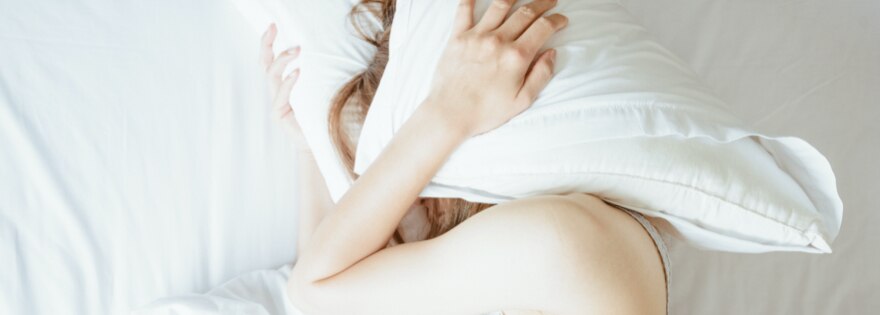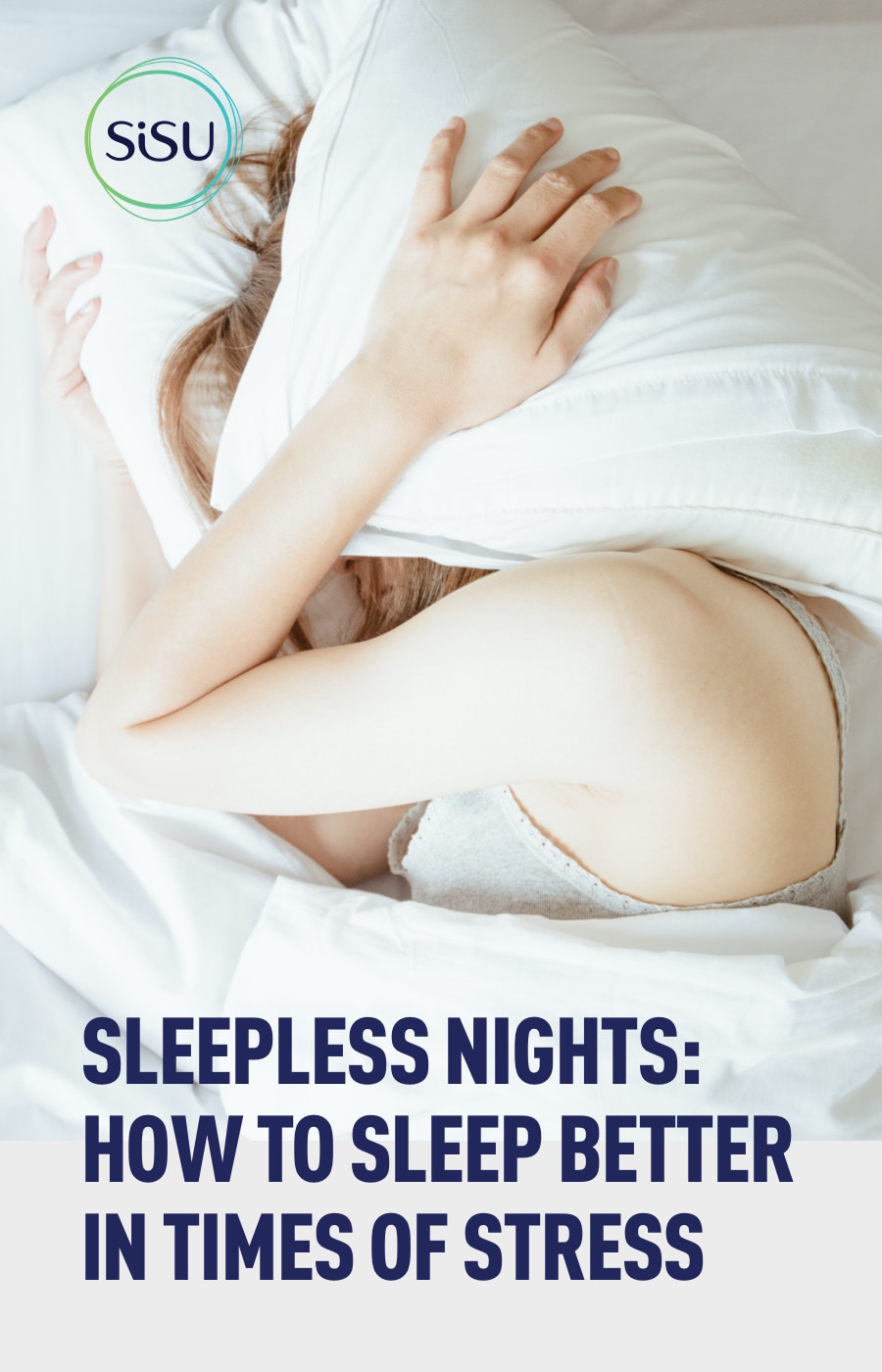

Adequate sleep is a cornerstone to health, yet getting a good night’s sleep can sometimes be the most challenging part of the day instead of the most restful – especially in times of stress.
We’ll look at how much sleep you should be getting and helpful practices and supplements to help you get a more restful sleep.
Why exactly is sleep so important?
Sleep is an essential function that allows the body and mind to recharge. Adequate sleep helps the body stave off illness, repair muscle damage, and rejuvenate the mind. Not getting enough sleep can impair your ability to think clearly, concentrate, and develop memories.1
Sleep is also crucial for the functioning of the immune system. Without enough sleep, the body makes fewer cytokines – a protein that targets infection and inflammation, creating an immune response. The body both produces and releases cytokines while you sleep, so skimping on sleep has serious effects on your immune system.2
How much sleep do you need?
The right amount of sleep varies depending on age and individual lifestyles. On average, according to the Sleep Foundation, the average adult needs between seven to nine hours of sleep each night. Children need anywhere from nine to fourteen hours of sleep, and teens require eight to ten hours.
However, someone who works a highly active job may need more sleep than someone who works at a desk. Likewise, someone who has ongoing health concerns probably requires more sleep than someone who is generally healthy.3
For more information on which amount of sleep is right for you, visit sleepfoundation.org.
Fostering good sleep habits during the day
Believe it or not, getting the best sleep possible starts the minute you wake up. You can make many decisions throughout your day that can affect the quality of your sleep, especially in the hours leading up to your bedtime.
Let’s look at a few ways you can improve your sleep before you even get under the covers.
Exercise
Not only does exercise help you cope with immediate stress by releasing positive endorphins in your brain, but it can also help improve your sleep at night. Regular exercise, especially in the morning or afternoon, can raise your body temperature a few degrees. Later, when your internal thermostat drops back to its normal range, this can trigger feelings of drowsiness, which helps you sleep.
However, to reap the benefits of exercise for sleep, the time of day you workout is important. If you work out in the morning, you’ll enjoy a longer, deeper sleep at night. If you choose to workout in the afternoon, your body temperature will rise then fall, causing a feeling of drowsiness just when you’re ready for bed. Exercising in the evening may cause stimulation that will keep you awake rather than put you to sleep.4
Monitor your caffeine intake
Let’s admit it; many of us rely on caffeine to help get us through the day, or at least to start our morning. In moderation, caffeine can increase alertness. However, too much caffeine, especially close to bedtime, can significantly impact your sleep. Try monitoring and adjusting your caffeine intake to see how it affects your rest.
Don’t hang out in bed during the day
People working from home or those with smaller living spaces may be tempted to work or eat from bed throughout the day. However, maintaining physical boundaries and areas – i.e., the kitchen is for eating, the desk is for working, and the bed is for sleeping – helps the brain relax when you go to bed.
Go to bed and wake up at a consistent time
Most people accept bedtimes as being suitable for children but neglect it as they get older. However, going to bed and waking up at the same time can help maintain your circadian rhythm – also known as your biological clock – ultimately improving your quality of sleep.
Bedtime habits to improve your sleep
Whether you foster good sleep habits during the day or not, the hour before you go to bed can greatly affect how well you sleep.
Here are a few habits to add to your bedtime routine:
Write a to-do list for the next day
If you’re stressed about the upcoming day, try writing a to-do list for the next day before you go to sleep. One study followed two groups – one which wrote out their to-do list before bed, and the other wrote a list of things they had already completed. Those who wrote a to-do list fell asleep significantly more quickly, suggesting that writing about stress-factors may help you fall asleep faster.5
Put the screens away
Although you may find scrolling Instagram or watching YouTube videos relaxing, the blue light from your screens can restrain the production of melatonin – the hormone that controls your sleep-wake cycle. Besides increasing your alertness when you should be getting sleepy, using your devices before bed delays the onset of REM sleep, reducing the overall amount of REM sleep you get and compromising your alertness in the morning.6
Practice relaxing yoga
Yoga is a gentle way to wind down after a stressful day. One study found that 55% of people who did yoga said that it helped them get better sleep, and 85% said it helped reduce stress.7 Focus on deep, controlled breathing while relaxing your muscles to prepare them for sleep.
Supplements to help you sleep
Melatonin
Melatonin is a naturally-occurring hormone that controls your sleep-wake cycle, or circadian rhythm. Available in 5 mg or 10 mg tablets or liquid drops, Sisu Melatonin helps to reduce the time it takes to fall asleep and increase total sleep time in people suffering from sleep restriction or altered sleep schedule.
Magnesium
Magnesium plays a role in supporting deep sleep by maintaining healthy levels of GABA, a neurotransmitter that promotes sleep.8 Sisu Magnesium Relaxation Blend contains GABA and L-theanine, which helps temporarily promote relaxation. It is vegan and non-GMO, and comes in easy-to-mix, lemonade, tart cherry and honey grapefruit flavoured powders.
L-Theanine
Naturally occurring in green tea, L-theanine helps sleep by boosting sleep-inducing brain chemicals, enhancing alpha brain waves, and lowering levels of excitatory brain chemicals.9 Sisu Stress Rescue helps to temporarily promote relaxation by providing 250 mg of relaxing L-theanine.
The A to Zzzzz’s of sleep
A good night’s sleep has the potential to affect not only your mood but your overall health. Practicing good sleep hygiene and taking sleep-supporting supplements can help you get the rest your body deserves.
To add a dose of health and wellness to your feed, follow us on Instagram (@sisuvitamins) or Facebook (Sisu Vitamins).
Always read and follow the product label. Products may not be suitable for everyone.
1 https://www.ninds.nih.gov/Disorders/Patient-Caregiver-Education/understanding-Sleep
2 https://www.sleepfoundation.org/articles/how-sleep-affects-your-immunity#:~:text=Sleep%20and%20Cytokines,you%20skimp%20on%20shut%2Deye
3 https://www.sleepfoundation.org/articles/why-do-we-need-sleep
4 https://www.sleepfoundation.org/articles/how-exercise-impacts-sleep-quality
5 https://psycnet.apa.org/record/2017-47677-001
6 https://www.sleepfoundation.org/articles/why-electronics-may-stimulate-you-bed
7 https://www.health.harvard.edu/blog/8753-201512048753#:~:text=A%20national%20survey%20found%20that,helped%20them%20get%20better%20sleep
8 https://www.psychologytoday.com/ca/blog/sleep-newzzz/201805/what-you-need-know-about-magnesium-and-your-sleep#:~:text=Magnesium%20plays%20a%20role%20in,in%20people%20with%20poor%20sleep
9 https://www.psychologytoday.com/ca/blog/sleep-newzzz/201708/what-you-need-know-about-l-theanine#:~:text=L%2Dtheanine%20promotes%20relaxation%20and,well%20as%20serotonin%20and%20dopamine

